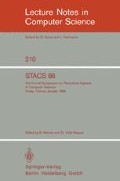Abstract
This note clarifies which oracles separate NP from P and which do not. In essence, we are changing our research paradigm from the study of which problems can be relativized in two conflicting ways to the study and characterization of the class of oracles achieving a specified relativization. Results of this type have the potential to yield deeper insights into the nature of relativization problems and focus our attention on new and interesting classes of languages.
A complete and transparent characterization of oracles that separate NP from P would resolve the long-standing P=?NP question. In this note, we settle a central case. We fully characterize the sparse oracles separating NP from P in worlds where P=NP. We display related results about coNP, E, NE, coNE, and PSPACE.
Research supported by NSF grant DCR-8301766.
Research supported by a Fannie and John Hertz Foundation Fellowship and NSF grant DCR-8301766.
Preview
Unable to display preview. Download preview PDF.
References
T. Baker, J. Gill, and R. Solovay, “Relativizations of the P=?NP Question,” SIAM Journal on Computing, 1975, pp. 431–442.
J. Balcázar, R. Book, T. Long, U. Schöning, and A. Selman, “Sparse Oracles and Uniform Complexity Classes,” FOCS 1984, pp. 308–313.
A. Chandra, D. Kozen, and L. Stockmeyer, “Alternation,” JACM, V. 26, #1, 1981.
M. Furst, J. Saxe, and M. Sipser, “Parity, Circuits, and the Polynomial-Time Hierarchy,” FOCS 1981, pp. 260–270.
W. Gasrarch, “Recursion Theoretic Techniques in Complexity Theory and Combinatorics,” Center for Research in Computing and Technology Report TR-09-85, Harvard University, May 1985.
J. Hartmanis, "Generalized Kolmogorov Complexity and the Structure of Feasible Computations,” Cornell Department of Computer Science Technical Report TR 83-573, September 1983.
J. Hartmanis, to appear in EATCS Bulletin.
J. Hartmanis and Y. Yesha, “Computation Times of NP Sets of Different Densities,” Theoretical Computer Science, V. 34, 1984, pp. 17–32.
K-I. Ko, “On Self-reducibility and Weak P-Selectivity,” Journal of Computer and System Sciences, V. 26, 1983, pp. 209–221.
R. Karp and R. Lipton, “Some Connections Between Nonuniform and Uniform Complexity Classes,” STOC 1980, pp. 302–309.
S. Mahaney “Sparse Complete Sets for NP: Solution of a Conjecture of Berman and Hartmanis,” FOCS 1980, pp. 54–60.
M. Sipser, “A Complexity Theoretic Approach to Randomness,” STOC 1983, pp. 330–335.
C. Wrathall, “Complete Sets and the Polynomial-time Hierarchy,” Theoretical Computer Science, V. 3, 1977, pp. 23–33.
C. Yap, “Some Consequences of Non-uniform Conditions on Uniform Classes,” Theoretical Computer Science, V. 26, 1983, pp.287–300.
Author information
Authors and Affiliations
Editor information
Rights and permissions
Copyright information
© 1985 Springer-Verlag Berlin Heidelberg
About this paper
Cite this paper
Hartmanis, J., Hemachandra, L. (1985). On sparse oracles separating feasible complexity classes. In: Monien, B., Vidal-Naquet, G. (eds) STACS 86. STACS 1986. Lecture Notes in Computer Science, vol 210. Springer, Berlin, Heidelberg. https://doi.org/10.1007/3-540-16078-7_86
Download citation
DOI: https://doi.org/10.1007/3-540-16078-7_86
Published:
Publisher Name: Springer, Berlin, Heidelberg
Print ISBN: 978-3-540-16078-6
Online ISBN: 978-3-540-39758-8
eBook Packages: Springer Book Archive

